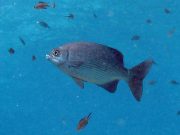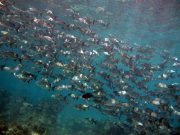Dykning med Sø-brasen
Koh Lantas Marineliv | kyphosidae
De 54 arter af sø-brasen har korte hoveder, stumpe snuder og små munde. De har stærke, tætstående tænder, der har en mærkelig form som hockeysticks, og to arter ses ofte på dykkerture ved Koh Lanta.
De har en enkelt, sammenhængende rygfinne, der kan foldes ind i en skællet rille. De har en kløvet hale og er normalt af en kedelig farve og kan have nogle blålige eller gullige striber.
Sø-brasen er stort set planteædende og lever hovedsageligt af alger, mens andre er kødædende og lever af hvirvelløse dyr, der findes på havbunden, klipper og koraller.
Der kan dannes meget store stimer i lavvandede områder med klipper og koralrev for at finde føde, og vi ser dette nogle gange omkring Koh Haa-øerne.
Medlemmer af denne familie samles nogle gange i stort antal for at gyde i det åbne hav.
2 arter fundet på denne side:
Topsail Drummer
(Kyphosus cinerascens)
The Topsail Drummer, Kyphosus cinerascens, is found in small to large schools in shallower reef areas where there is abundant algae growth. Their diet consists of invertebrates, algae and seaweed. When feeding as a large school, they can quickly overwhelm territorial damselfishes and surgeonfishes.

Kyphosus cinerascens @ Koh Haa
The Topsail Drummer is typically a silvery-grey fish with fine horizontal lines along the side, a pale stripe on the cheek, and a large tail fin.
The fish has a small bump over the eyes and a more pointed, downward angled snout that other fish of the same genus.
The dorsal fin runs the length of the fish and appears 'connected' to the anal fin.
The Topsail Drummer is poisonous to humans and should not be eaten.
Lowfin Drummer
(Kyphosus vaigiensis)

Pair of Kyphosus vaigiensis @ Koh Haa
The Lowfin Drummer has two phases, the first having a silvery grey body with narrow bronze stripes, and the second phase with a darker body and numerous white spots. The Lowfin Drummer can rapidly change phase.
The rear dorsal fin is not elevated (as in the Topsail Drummer) and the outer edge of the anal fin is diagonal, aligning with the outer edge of the upper tail lobe.
The Lowfin Drummer grows to 45 cm and forms small to very large groups in rocky shore areas or above reef flats.
Dykning med Sø-brasen omkring Koh Lanta
Dykning og snorkelture
Hvis du gerne vil have chancen for at se Sø-brasen på en af vores daglige dykkerture i højsæsonen fra Koh Lanta, så send os en e-mail til info@diveandrelax.com.
Deltag i vores speedbådsdykkerture i højsæsonen til nogle af Thailands bedste dykkersteder og nyd små grupper, korte rejsetider med fokus på god personlig service, sikkerhed og sjov.
Er du endnu ikke certificeret dykker? Lær at dykke på Koh Lanta med det 3-dages SSI Open Water Diver-kursus.
Book online og spar 10% på dykkerture og dykkerkurser på Koh Lanta.
Få mere at vide
Indo-Stillehavets havdyrsguider
- Allen, G., Steene, R., Humann, P., DeLoach, N. (2003) Reef Fish Identification, Tropical Pacific. Jacksonville, FL., USA: New World Publications, Inc., ISBN 1-878348-36-1.
- Humann, P., DeLoach, N., (2010) Reef Creature Identification, Tropical Pacific. Jacksonville, FL., USA: New World Publications Inc., ISBN 978-1-878348-44-9
- Debelius, H. (2013) Indian Ocean Reef Guide. Frankfurt, Germany: IKAN - Unterwasserarchiv, ISBN 978-3-939767-52-7.
- Debelius, H. (2004) Nudibranchs and Sea Snails, Indo-Pacific Field Guide. Frankfurt, Germany: IKAN - Unterwasserarchiv, ISBN 3-925919-51-1
- Erhardt, H., Knop, D. (2015) Corals Indo-Pacific Field Guide. Frankfurt, Germany: IKAN - Unterwasserarchiv, ISBN 3-925919-69-4.
- Veron J.E.N., Stafford-Smith M.G., Turak E. and DeVantier L.M. (2016). Corals of the World
Flere referencer om havets dyreliv og yderligere information


